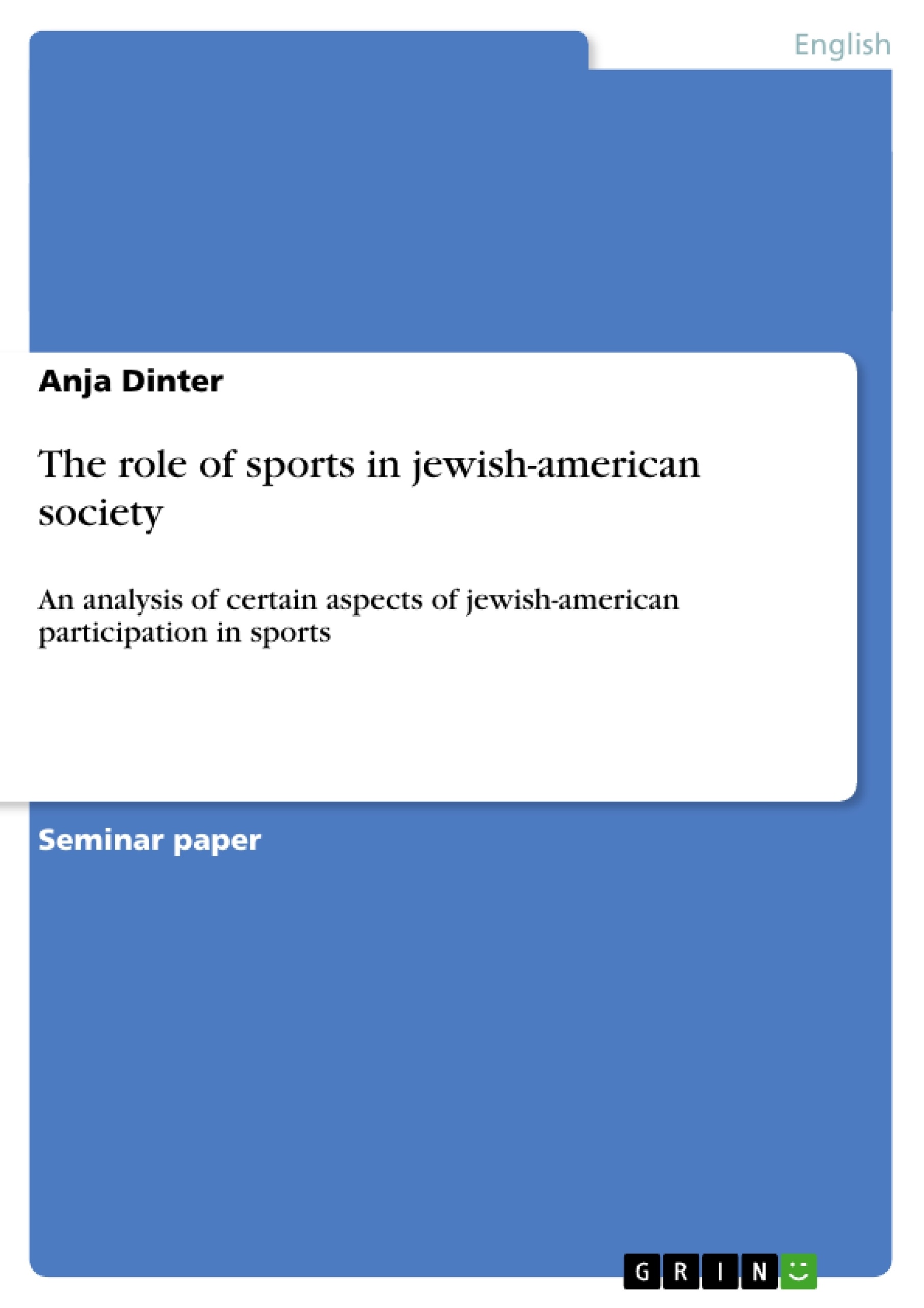It is the aim of the following work to analyze the role of sports in Jewish-American life, mainly concentrating on the time until the end of the World War II.
Up to the present day the notion of Jewish culture and tradition emphasizing intellectual accomplishments and the life of the mind and not having place for sport and the physical has been prevalent. Due to the traditional emphasis of learning and an appreciation for sophistication during all of Jewish history, the stereotype view of a general rejection of sports by Jews and the image of Jewish physical weakness seems to have evolved as a consequence. This image has even been misrepresented by anti-Semites, as Henry Ford, to show that Jewish-Americans are “ill-fit to be true Americans”.
Previously read books dealing with Jewish sports in Germany and an article on the importance of sports within Jewish religion that contradicted the image mentioned above, let an increased interest in the specific mind-set of Jewish-Americans towards physical activities develop.
Due to the complexity of the topic and the extent of this paper only certain aspects can be presented in the discourse, unfortunately excluding other interesting ones. The focus will be on the actual participation and achievements as well as attitudes of Jews towards sports and the effects of this field on the integration of Jewish immigrants. The time frame has been limited to the period between the first large waves of immigration and the end of World War II because of the adjustment of Jewish sports to general developments thereafter. Nevertheless, some general tendencies of the post-World War II decades will be discussed.
Background information on the general historical context and the evolution of American Sports will ensure a better and deeper understanding of the issues discussed.
Inhaltsverzeichnis (Table of Contents)
- Introduction
- The Jewish-American Experience of Sports
- Historical Context and the Evolution of American Sports
- Jewish-American Participation in Sports
- Sports as a Means of Assimilation as well as Preserving Jewish Identity
- The Importance of Baseball as The National Game
- Conclusion
- Bibliography
Zielsetzung und Themenschwerpunkte (Objectives and Key Themes)
This paper examines the role of sports in Jewish-American life, focusing on the period leading up to the end of World War II. It challenges the prevailing notion of a Jewish culture that prioritizes intellect over physical activity, exploring the complexities of Jewish-American participation in sports and its impact on assimilation and identity preservation.
- The evolution of American sports and its intersection with Jewish immigration
- Jewish-American attitudes towards sports and leisure
- The role of sports in Jewish-American assimilation and identity
- The impact of discrimination on Jewish-American participation in sports
- The significance of baseball as a national game for Jewish-Americans
Zusammenfassung der Kapitel (Chapter Summaries)
- Introduction: This chapter establishes the aim of the paper, which is to analyze the role of sports in Jewish-American life, focusing on the period until the end of World War II. It challenges the stereotype of Jewish disinterest in sports, highlighting the influence of anti-Semitic views on this perception.
- The Jewish-American Experience of Sports: This section delves into the historical context and evolution of American sports, examining the impact of mass immigration on their development. The chapter explores the complex relationship between Jewish-Americans and leisure activities, highlighting the historical and cultural factors influencing their participation in sports.
- Historical Context and the Evolution of American Sports: This chapter explores the development of American sports in the late 19th and early 20th centuries, coinciding with the influx of Jewish immigrants. It analyzes the socioeconomic conditions that shaped leisure activities and discusses the emergence of organized sports and professional leagues.
- Jewish-American Participation in Sports: This section examines the attitudes and experiences of Jewish-Americans towards sports in the first half of the 20th century. It discusses the influence of discrimination and the "workaholic" mentality on Jewish-American participation in sports, highlighting the constraints on leisure activities.
Schlüsselwörter (Keywords)
Key terms and concepts explored in this paper include Jewish-American history, sports participation, assimilation, identity, discrimination, leisure, work ethic, baseball, and the evolution of American sports.
Frequently Asked Questions
What is the common stereotype regarding Jews and sports?
The prevailing stereotype suggests that Jewish culture emphasizes intellectual accomplishments over physical activity, leading to an image of Jewish physical weakness.
How did sports help Jewish immigrants in America?
Sports served as a powerful means of assimilation into American society while also helping to preserve a distinct Jewish-American identity.
Why was baseball particularly significant for Jewish-Americans?
Baseball, as the "National Game," provided a platform for Jewish-Americans to prove they were "true Americans" and to excel in a quintessentially American field.
How did anti-Semitism influence the perception of Jewish athletes?
Figures like Henry Ford used the stereotype of physical weakness to claim Jewish-Americans were "ill-fit" for American life; the paper challenges these misrepresentations.
What time period does the study cover?
The focus is on the period between the first large waves of immigration and the end of World War II.
- Citar trabajo
- Anja Dinter (Autor), 2003, The role of sports in jewish-american society , Múnich, GRIN Verlag, https://www.grin.com/document/75116



